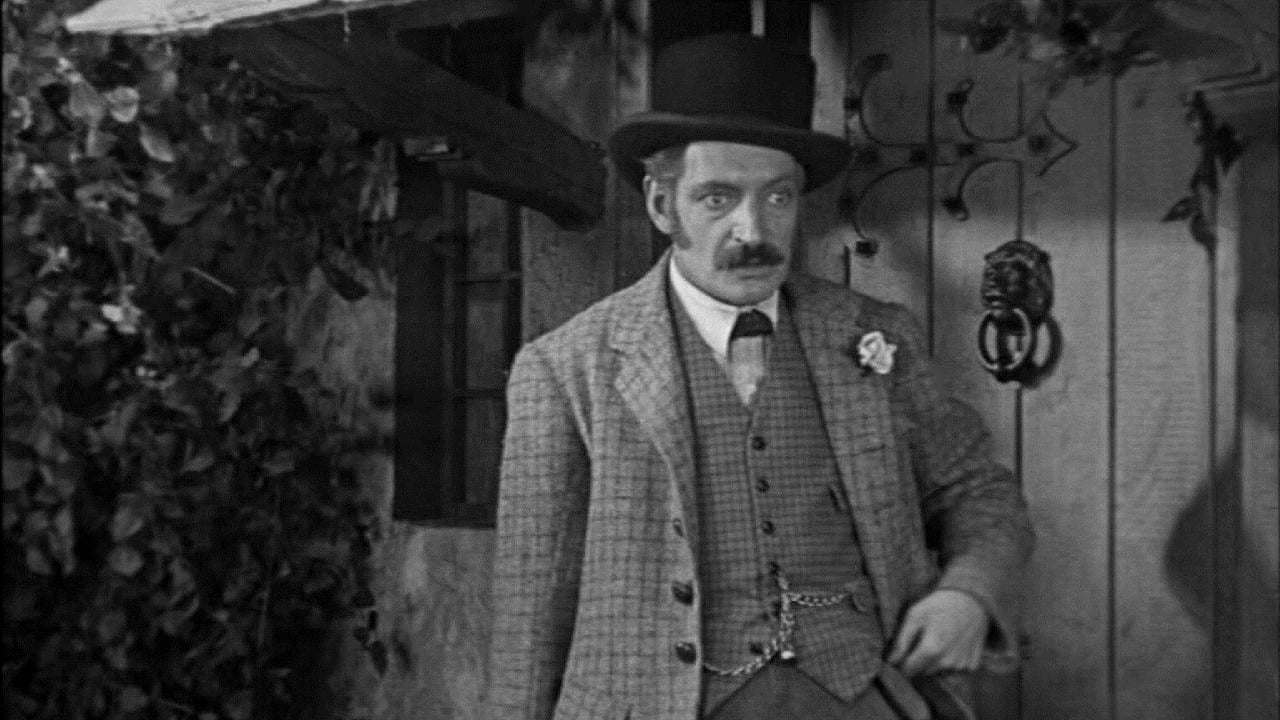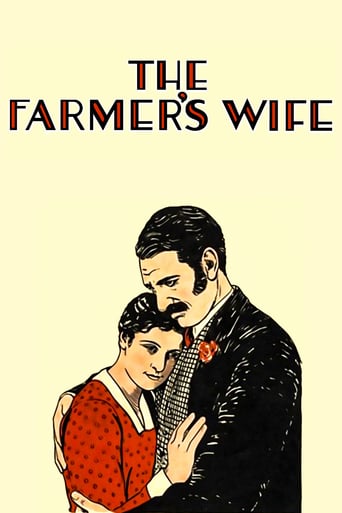2freensel
I saw this movie before reading any reviews, and I thought it was very funny. I was very surprised to see the overwhelmingly negative reviews this film received from critics.
Mischa Redfern
I didn’t really have many expectations going into the movie (good or bad), but I actually really enjoyed it. I really liked the characters and the banter between them.
Myron Clemons
A film of deceptively outspoken contemporary relevance, this is cinema at its most alert, alarming and alive.
Beulah Bram
A film of deceptively outspoken contemporary relevance, this is cinema at its most alert, alarming and alive.
wes-connors
After his wife dies, and their daughter marries, lonely widowed farmer Jameson Thomas (as Samuel Sweetland) decides to look for holy matrimony with another woman. With the help of devoted housekeeper Lillian Hall-Davis (as Minta Dench) and handyman Gordon Harker (as Churdles Ash), Mr. Thomas proposes to three matronly prospects: independent widow Louie Pounds (as Louisa Windeatt), frigid spinster Maud Gill (as Thirza Tapper), and pillowy postmistress Olga Slade (as Mary Hearn). None of the women prove to be satisfactory, but Thomas' ideal mate is closer than he thinks… If "The Farmer's Wife" were filmed a few years earlier, in Hollywood, with Wallace Reid and Norma Shearer, we might have had four decades of romantic Alfred Hitchcock comedies… well, maybe not. Anyway, it's a good silent moving picture. The opening sequence, which shows the sad passing of the farmer's wife, is very effective; it's a good change from the original play, considering the silent film medium. But, this film is too long, with the daughter's marriage immediately and unnecessarily dragging the story down; moreover, the ending is drawn out. Mr. Hitchcock's food filming fetish is evident throughout - nobody touches Ms. Gill's gelatin! ****** The Farmer's Wife (3/2/28) Alfred Hitchcock ~ Jameson Thomas, Lillian Hall-Davis, Gordon Harker, Maud Gill
secondtake
The Farmer's Wife (1928)Like many of Alfred Hitchcock's more famous films, The Farmer's Wife begins with pure innocence (a beautiful day in the country, followed by two adorable puppies, maybe the cutest things in any of his movies). And unlike almost all of his movies, it remains pure and happy throughout. Even the fact that a woman (the main character's wife, we learn) is dying in the first scenes is no impediment to the joy of life in the beautiful countryside--her last words are a reminder to the maid to "air out the master's pants." Can't you hear Hitchcock laughing?This is no diabolical thriller. The only suspense here is who the man might marry next, and I think we are meant to know the answer to that pretty early on, as well. There is a nice montage of him getting dressed around forty minutes into the film. And just before that a fun trick of imagining future wives and seeing them fade in, sitting on a chair, and then fade back to an empty chair. (This reprises toward the end, as well, and it's briefly hilarious.) Some of the scenes are genuinely beautiful, and others have a candor and quickness to the actions that is fresh and honest. And when everyone leaves for the hunt, the number of cute little dogs used is quite astonishing--over a hundred, I think.Yes, a lighthearted, nicely felt film, a bit slow all along and over two hours long, but there is a feeling of competence here. Is it recommendable? Only if you are really just interested in a calm, sweet tale. The man's quest for a mate is a comedy, with one rejection after another. The acting is generally quite good, especially the many women. The bum caricature isn't a help, and the main man, played by Jameson Thomas, is merely appropriate at being strong and irritable. Some of his lines are pretty funny because he's mean when he doesn't need to be, and the women either squeal or laugh.And how's this for a line to a woman to persuade her to marry him: "You'll only feel the velvet glove and never know I was breaking you in." She says no.
ackstasis
Watching the mostly-unimpressive early films of Alfred Hitchcock is a price that we director completists must pay for our enthusiasm. Aside from 'The Lodger (1927),' the first film that distinctly possesses the air of a classic Hitchcock thriller, most of his silent films are rather feeble affairs. Still unsure of his strengths, the future Master of Suspense trialled both melodramas, such as 'Easy Virtue (1928),' and comedies, such as 'The Farmer's Wife (1928).' Viewing these early efforts is often worthwhile, since, even though their quality may not be ideal, it's usually easy to pick out the unique and original film-making techniques that – with the aid of hindsight – broadcast the arrival of a genius. Stylistically, 'The Farmer's Wife' shows nothing that could be described as classically "Hitchcockian." Apart from the neat (but not unique) trick of cross-fading each potential bride into the opposite chair, there's nothing to suggest that this is the craft of a keen new innovator in the cinematic language; any play adaptation from that period to sure to look much the same.Fortunately, the film's saving grace comes from the fact that Hitchcock was among the authors of the screenplay, adapted from a play by Eden Phillpotts. It is in the writing, not the visuals, that Hitch's famed talents come shining through, and his wicked sense of humour is simply unmistakable. This is most readily noticed in the story's somewhat-sadistic treatment of Samuel Sweetland's prospective brides, whose overblown faults are emphasised and mocked to the point of cruelty. This unique dark streak adds some liveliness to the otherwise-dull romantic hijinks, and Lillian Hall-Davis' quiet, sincere housekeeper, Minta, serves as a pleasant counterpoint to the parade of grotesque suitors whom our main protagonist first considers for marriage. Jameson Thomas {whom you'll also briefly glimpse in 'The Invisible Man (1933)' and 'Mr. Deeds Goes to Town (1936)'} is impressive in the main role, showing some convincing emotion as he snaps briskly from confidence, to anger and, finally, to desperation, as his repeated marriage proposals are rejected by generally-undesirable women.Except for Thomas, who soon travelled to Hollywood and contributed plenty of small roles, most of the cast is unnotable. Considering Lillian Hall-Davis' subtle, heartfelt performance, I was saddened to hear of her suicide in 1933 – is it just me, or did a lot of actors end their lives in a such a way during the 1930s? There's really little else to say about 'The Farmer's Wife.' Some Hitchcockians will undoubtedly cherish the director's wicked sense of humour {which later found its most pure form in 'The Trouble with Harry (1955)}, while others will find themselves losing concentration as the entirely predictable romantic plot unfolds. This is one strictly for the Alfred Hitchcock completists, but even those intrepid souls should tread carefully. I consider it fortunate that the VHS copy I found apparently ran the film at a increased frame-rate, cutting the running-time to just over 100 minutes; I'm quite sure that playing over two hours would have constituted overstaying its welcome.
Hitchcoc
You could see Hitchcock's visual craft developing in this silly tale of a widowed farmer who is determined to find a wife, while not seeing what is right under his nose. The facial expressions and longings of the characters are quite well done, considering the age of this piece. It is mostly farcical and simple, but everyone must learn his craft, and this is no exception. I was quite taken with the three women he chose pursue. They represent some levels of ugliness and silliness that make the movie work. It shows how slim the pickings are in the village. It also presents a time when things were quite different. There is a great scene at the end which I won't spoil that is priceless. If you are looking for true Hitchcock, don't bother, but if you want to see the foundation of genius, take parts of this into your embrace.


